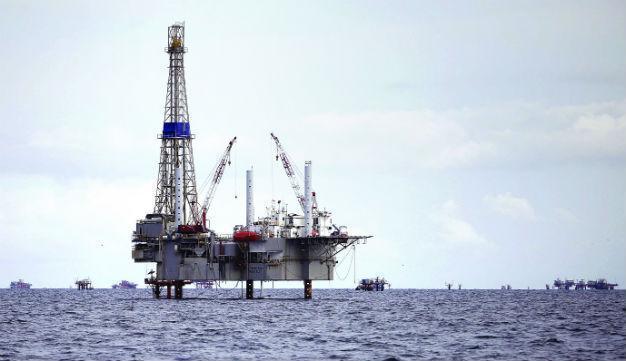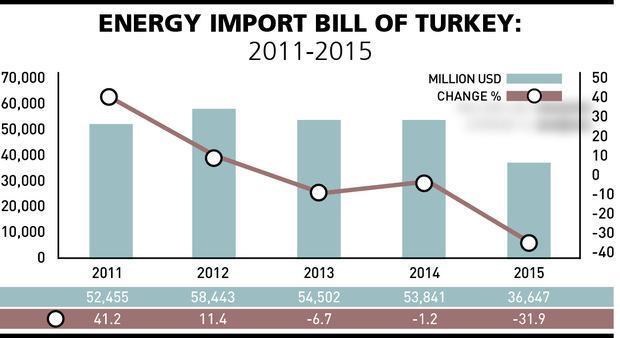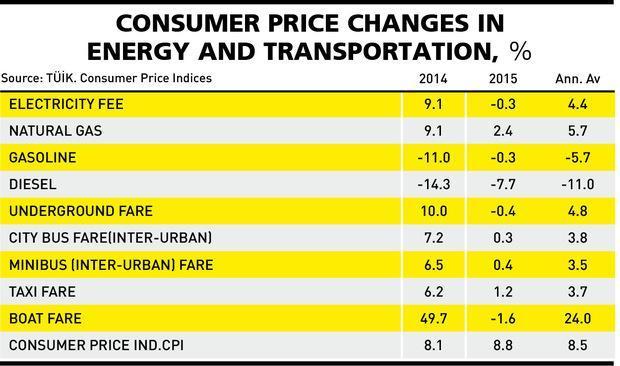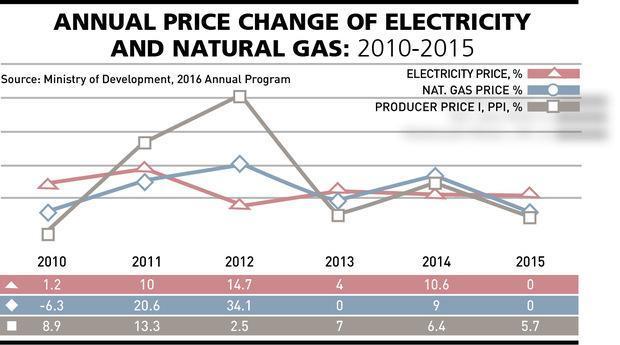Global energy plunge not producing lower prices in Turkey
Mustafa Sönmez - mustafasnmz@hotmail.com

REUTERS photo
Turkey’s energy consumption has seen a sharp increase since 2003, hitting $40 billion annually with an average growth of 5 percent in the country’s gross domestic product (GDP). The demand for electricity has also grown at around 5 percent annually for the last 16 years.Skyrocketing demand is, however, mainly being met by imported crude oil and natural gas.
The trend makes securing an unstopped flow of foreign currency and energy imports the basis of the country’s energy policy. The latest tensions with Russia and Iran, the largest energy suppliers for Turkey, have reminded the country of this fact once more.

Gas dependence
Natural gas has had the largest share in Turkey’s power generation since 2008 as the country lacks fossil fuel reserves other than lignite. Its share increased to 32.5 percent in the country’s primary energy consumption by the end of 2014. While Turkey’s natural gas consumption was around 46 billion cubic meters (bcm) in 2013, this amount increased to 48.7 bcm in 2014, representing a 6 percent of increase. Some 48 percent of the gas was used for power generation purposes in 2014. The remaining 25 percent of the gas was utilized by the manufacturing sector and 27 percent for heating. It is estimated that Turkey’s gas consumption did not fall below 48 bcm in 2015.
Turkey’s electricity production is estimated to have increased from 257.2 billion kWh in 2014 to 262.5 billion kWh in 2015. The consumption also rose from 3,326 kWh per capita in 2014 to 3,359 kWh in 2015.
The overwhelming dependence on foreign gas has created a significant energy security risk that is worsened by high dependence on oil imports as well.
Energy bill
Until one year ago, Turkey’s energy costs constituted over one-fourth of its total imports, creating a huge burden. While Turkey paid around 52.5 billion for energy imports in 2011, this figure approached $58.5 billion in 2012. Turkey paid an energy bill of around $54 billion each in 2013 and 2014. Thanks to the global oil plunge, Turkey’s energy bill decreased to $36.6 billion in 2015, a 32 percent decrease compared to the previous year.

While the crude oil price was over $112 per barrel in June 2014, we saw this figure plunge to $38 at the end of 2015. Experts believe that the dip has yet to come, estimating that the Brent oil price will be around $29.2 by the end of first quarter of the year amid concerns of recession and “panic” levels in the risk appetite in global markets.
According to the International Energy Agency (IEA), a larger rise in the energy supply could occur with a further decline in global demand and an expected rise in Iran’s energy exports, which will push down prices even more. The IEA has already slashed its global oil demand estimates for 2016 amid the slowdown in the Chinese economy, although it has decreased its global supply forecasts with the exception of the Organization of the Petroleum Exporting Countries (OPEC). While the non-OPEC supply is expected to decline by 600,000 barrels per day in 2016, Iran may fill this gap in a very short time. At the end of the day, the world may face an oil surplus of around 1.5 million barrels on a daily basis by the end of the first half of this year.
The oil plunge has enabled energy-importing countries to close their current account deficits significantly, including Turkey. For instance, Turkey’s current account gap, which was around $46.5 billion in 2014, decreased to $28 billion by the end of November 2015.
While crude oil prices saw an average decrease of 47.3 percent in 2015, natural gas prices also decreased by 28 percent on a monthly basis. The biggest drop in crude oil prices was in September last year, with a drop of more than 51 percent compared to the same month of 2014. The biggest decline in natural gas prices was seen in December 2015 with around a 38 percent decrease compared to the same month of 2014.
What about consumer prices?
Although Turkey’s energy bill decreased by around $17 billion in 2015 compared to the previous year, we cannot say consumers enjoyed the cheaper prices. On the contrary, consumers faced significant hikes in many energy products and the complementary transport services in January 2016, triggering reactions among both producers and consumers.

The hikes in the prices of electricity and gas used by manufacturing industries used to be made in line with the increases in imported goods prices in previous years, during which energy prices were much higher. For instance, the electricity prices for the sector were increased by 8.1 percent for the 2010-2014 periods. This hike was around half a point higher than the producer price index in the mentioned time frame. The gas prices for the sector were also hiked by 11.5 percent in the mentioned period, constituting four point more than the producer price index. It was, however, seen that the government did not decrease prices in 2015, when import prices decreased dramatically.

Fuel prices are set in Turkey in the following way: The CIF Mediterranean product prices which are published in the Mediterranean-Italian markets are taken as “customs-free refinery prices.” The refinery price of Turkey’s main oil refinery, Koç-owned Tüpraş, constitutes around 23 percent of the product’s sale price. The state determines the main price as it takes 66 percent of the price of one liter of gasoline in the form of a special consumption tax and value-added tax (VAT). The remaining 11 percent of the earning is shared by distributors and dealers. At the end of the day, the state collected around 66 percent of each liter of gasoline worth $1.1 by the end of January 2016 as taxes.
The main gas importer is BOTAŞ in Turkey. According to the gas prices which are set by this company, a number of taxes are added to the original price and a final price is defined after the shares of the distributors are added.
The state collected around 51 billion Turkish Liras of taxes from these products in 2015, representing around 12.5 percent of the total tax income of the country.
Consumers are also complaining about the situation as they have not been able to benefit from the global energy plunge. Although the country bought natural gas in 2015 at prices that were roughly 30 percent cheaper than in 2014, there was only a very slight cut in electricity prices. Even electricity prices were hiked by around 7 percent at the beginning of 2016. Natural gas prices for residential areas were also increased by 9 percent and 2.4 percent in 2014 and 2015, respectively.
While crude oil prices decreased sharply, an average drop of 6 percent was the case in gasoline prices in Turkey both in 2014 and 2015. The average cut was 11 percent in diesel prices.
Price hikes in 2016
The energy watchdog, EPDK, hiked electricity prices by 6.7 percent in industrial areas and 3.8 percent in residential areas on Jan. 1.
The EPDK said retail electricity prices were hiked for the first time in the last 1.5 years because of necessary investments and the administrative costs of the electricity distribution companies, the need for further investments in transmission system and rising energy costs.
“The EPDK will closely follow whether these investments, which made the price hikes a must, are made so as to enable citizens to benefit from improving services. Any misconduct will not be permitted,” said the watchdog.
The EPDK’s decision was recently brought to the courts by the Chamber of Electrical Engineers (EMO). The organization has asked for the cancelation of the decision, saying the move contravenes the principle of transparency of the Electricity Market Code, as well as secondary regulations and the Law on Consumer Protection.
















